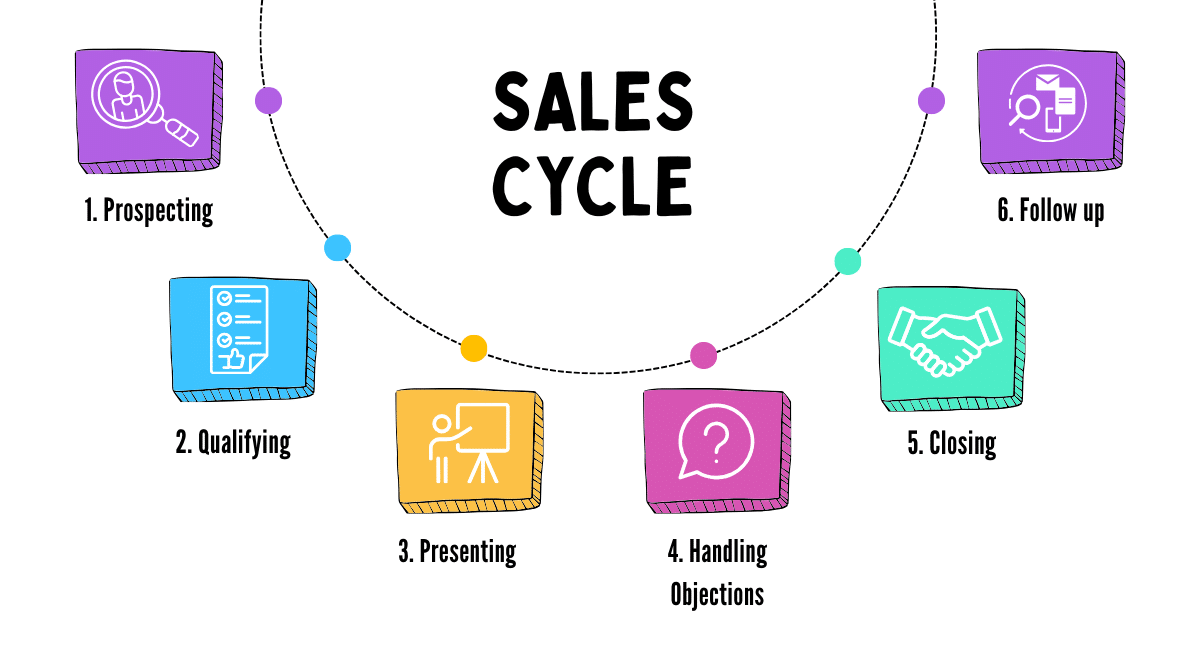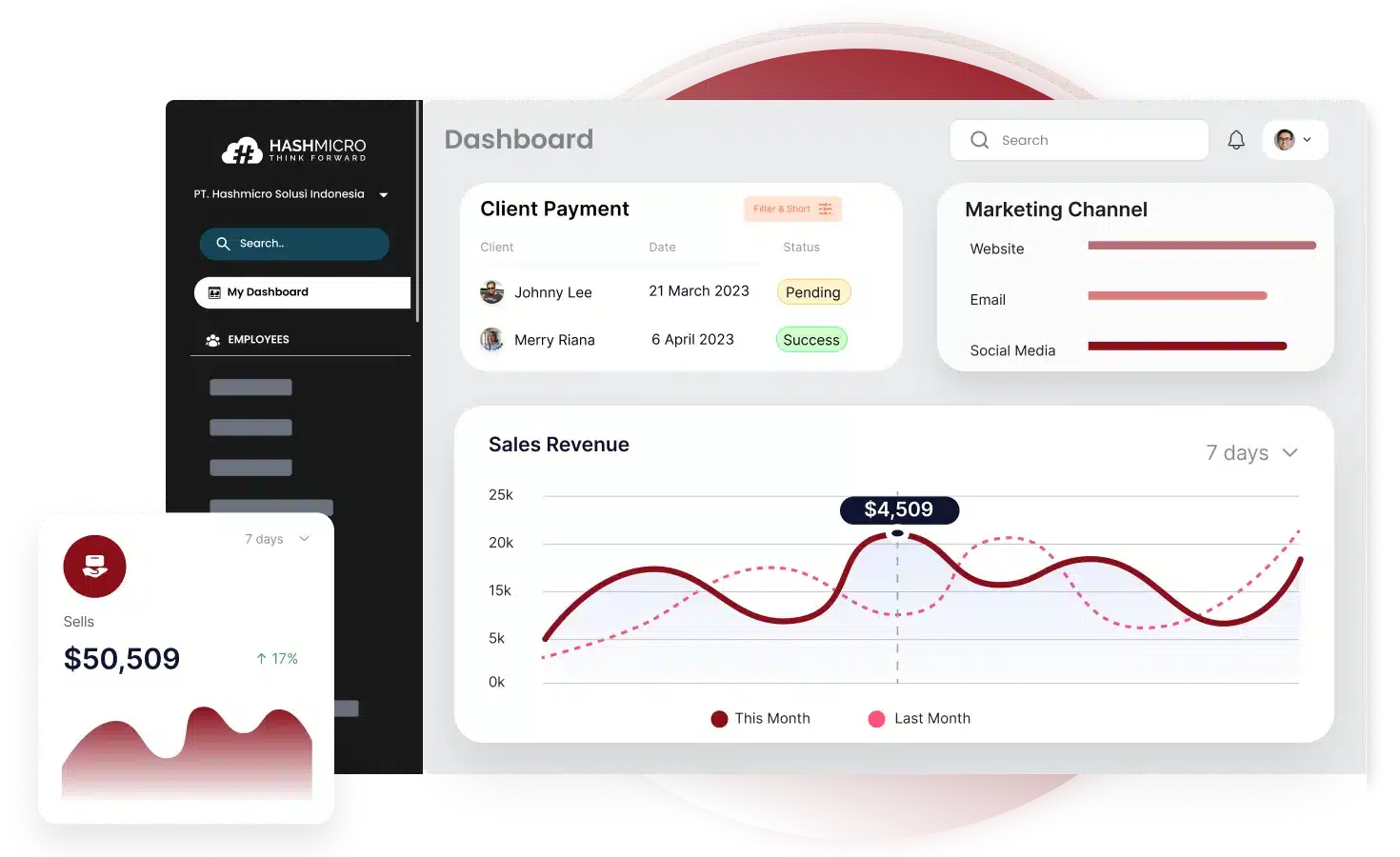The sales cycle is a critical process that businesses in Singapore must comprehend in order to maximize their sales potential and drive revenue. By implementing effective sales strategies at each stage of the cycle, businesses can enhance their chances of success.
This article will discuss detailed information about the sales cycle and its importance for business in Singapore, as well as how CRM Sales system streamlines business operations.
Key Takeaways
|
The Importance of the Sales Cycle
The sales cycle is a fundamental aspect of every business in Singapore. It serves as a roadmap that guides businesses through the process of attracting, engaging, and converting potential customers. By understanding the importance of the sales cycle, businesses can effectively manage their sales process and maximize their revenue potential.
One key element of the sales cycle is the sales funnel. This is the journey that a potential customer takes from the initial contact to the final purchase. It consists of different stages, including awareness, consideration, and decision-making. Each stage provides a unique opportunity for businesses to engage with customers and move them closer to making a purchase.
At the top of the sales funnel, businesses focus on lead generation. They aim to attract potential customers and create awareness about their products or services. As customers move down the funnel, businesses can tailor their sales strategies to address specific needs and overcome any objections or concerns. This personalized approach increases the chances of converting leads into paying customers.
The Importance of Sales Conversion
A crucial aspect of the sales cycle is sales conversion. This is the stage where potential customers make the final decision to purchase a product or service. By effectively managing the sales life cycle and guiding customers through the sales funnel, businesses can increase their sales conversion rate.
Implementing effective sales strategies at each stage of the sales cycle process is key to driving sales conversion. This includes providing exceptional customer service, addressing customer concerns, and offering incentives or discounts. By understanding the needs and preferences of customers, businesses can tailor their sales approach and increase the likelihood of conversion.
In conclusion, understanding the importance of the sales cycle is vital for businesses in Singapore. By implementing effective strategies and leveraging the sales funnel, businesses can navigate the sales cycle with ease and increase their sales conversion rate. The sales cycle provides a framework for businesses to engage with customers, build relationships, and drive revenue growth.
Understanding the Sales Cycle Stages
The sales cycle is a multi-step process that businesses in Singapore need to navigate to successfully convert leads into customers. By understanding the various stages of the sales life cycle, businesses can effectively guide potential customers through the buying process and increase their chances of making a sale. Let’s explore each stage in detail:
1. Prospecting
In the prospecting stage, businesses identify potential customers who may have a need for their products or services. This involves researching and reaching out to individuals or companies that fit the target customer profile. Prospecting can be done through various channels, such as cold calling, email marketing, social media outreach, and networking events. The goal is to generate leads and initiate the sales process.
2. Qualifying
Once leads are generated, the next stage is qualifying. During this stage, businesses determine if the prospect is a good fit for their offerings. This involves gathering information about the prospect’s needs, budget, timeline, and decision-making process. By qualifying leads, businesses can prioritize their efforts and focus on prospects who have a higher likelihood of converting into customers. This stage also helps businesses avoid wasting time and resources on leads that are unlikely to result in a sale.
3. Presenting
The presenting stage is where businesses showcase their products or services to qualified leads. This involves demonstrating how the offerings can fulfill the prospect’s needs and provide value. Businesses may use presentations, product demonstrations, case studies, or samples to effectively communicate the benefits of their offerings. It is important to address any customer concerns or objections during this stage and provide the necessary information to help prospects make an informed decision.
4. Handling Objections
During the sales process, prospects may have objections or concerns that need to be addressed. Handling objections is a critical stage of the sales cycle as it allows businesses to overcome barriers and build trust with the prospect. This stage requires active listening, empathy, and effective communication skills. By addressing objections in a satisfactory manner, businesses can alleviate any doubts or hesitations that the prospect may have and increase the chances of closing the sale.
5. Closing
The closing stage is where the sale is finalized. It involves obtaining a commitment from the prospect to purchase the product or service. Closing techniques may include negotiating pricing, offering incentives, providing additional information or guarantees, or creating a sense of urgency. The key is to ensure that the prospect feels confident in their decision and is ready to move forward with the purchase.
6. Follow-up
After the sale is closed, it is essential for businesses to maintain relationships with customers to encourage repeat business and foster loyalty. The follow-up stage involves staying in touch with customers, providing ongoing support, and seeking feedback. This helps businesses build long-term relationships, gather testimonials, and identify opportunities for upselling or cross-selling.
By understanding each stage of the sales cycle – prospecting, qualifying, presenting, handling objections, closing, and follow-up – businesses in Singapore can effectively guide potential customers through the buying process and increase their sales success. Implementing strategies and tactics specific to each stage can help businesses optimize their sales cycle and drive revenue growth.
Streamlining Sales Processes for Higher Efficiencies
When it comes to maximizing the sales cycle, businesses in Singapore need to focus on streamlining their sales processes for higher efficiencies. By effectively managing the sales pipeline, accurately forecasting sales, and identifying areas for improvement, businesses can optimize their sales life cycle and achieve better results.
One key aspect of streamlining the sales process is effectively managing the sales pipeline. This involves tracking the progress of leads and opportunities as they move through the different stages of the sales process. By having a clear view of where each lead stands in the pipeline, businesses can allocate resources more effectively. Also ensuring that no potential sales opportunities are missed.
Accurate sales forecasting is another essential component of streamlining the sales process. By analyzing sales data and trends, businesses can make more informed decisions and predict future sales with greater accuracy. This enables them to plan and allocate resources effectively, ensuring that they are well-prepared to meet customer demand.
Finally, businesses should continuously identify areas for improvement within the sales process. This could involve analyzing sales data to identify bottlenecks or inefficiencies, seeking feedback from sales team members to understand pain points, or leveraging technology to automate repetitive tasks. By constantly seeking ways to streamline and optimize the sales process, businesses can achieve higher efficiencies and drive better sales outcomes.
Key Strategies for Streamlining Sales Processes:
- Implement a CRM sales system: A CRM system provides businesses with the tools to effectively manage customer interactions, automate sales processes, and generate valuable insights.
- Train and empower sales team members: By providing comprehensive training and empowering the sales team, businesses can ensure that they have the knowledge and skills to effectively navigate the sales process.
- Regularly review and update sales processes: Sales processes should be regularly reviewed and updated to reflect changing customer needs and market dynamics.
- Leverage technology: Technology can automate repetitive tasks, improve communication and collaboration within the sales team, and provide valuable data and analytics to inform decision-making. One powerful technology example to boost sales processes to be more effective is CRM Sales system.
By implementing these strategies and continually evaluating and improving the sales process, businesses in Singapore can streamline their sales cycle for higher efficiencies and ultimately drive greater revenue growth.
Maximizing the Sales Cycle with CRM Sales System
A well-implemented CRM (Customer Relationship Management) sales system is essential for businesses to maximize their sales process. With a CRM sales system, businesses in Singapore can streamline their sales process, enhance customer interactions, and drive better outcomes. Here are some key ways in which a CRM sales system can help businesses maximize their sales cycle:
- Efficient Lead Management: A CRM sales system allows businesses to effectively manage and track leads throughout the sales cycle. It enables businesses to capture and store valuable customer data, ensuring that no potential leads are lost or overlooked.
- Automated Sales Processes: By automating repetitive sales tasks, a CRM sales system frees up valuable time for sales teams to focus on building customer relationships and closing deals. Automation also ensures consistency and accuracy in sales processes, reducing the risk of errors or missed opportunities.
- Valuable Insights: A CRM sales system provides businesses with valuable insights into customer behavior, preferences, and buying patterns. This data can be used to tailor sales strategies, personalize customer interactions, and identify cross-selling or upselling opportunities.
“A CRM sales system allows businesses to efficiently manage their sales pipeline, track customer interactions, and generate valuable insights for better decision-making.”
By leveraging the capabilities of a CRM sales system, businesses can optimize and maximize their sales potential. It provides them with a centralized platform to track and manage customer interactions, streamline sales processes, and gain a competitive edge in the Singaporean market.
One of the best CRM Sales systems in Singapore is HashMicro. Designed with their clients; unique needs in mind, their software offers unparalleled customization, intuitive design, and insightful analytics to drive your sales forward. Discover how HashMicro’s CRM-Sales system is revolutionizing Singaporean businesses by downloading the price scheme below. Also, claim the opportunity to get an EDG discount of up to 50%.
Implementing Effective Sales Strategies
Implementing effective sales strategies is crucial for businesses looking to maximize their sales cycle and drive revenue growth. By tailoring their approach to each stage of the sales cycle process, businesses can increase their chances of success and build strong customer relationships.
One key strategy is personalizing sales messages. By understanding the needs and preferences of potential customers, businesses can create tailored messages that resonate with them. This can involve addressing specific pain points, showcasing how the product or service meets their unique needs, and highlighting any relevant success stories or testimonials.
Exceptional customer service is another essential strategy. Providing a superior customer experience can set businesses apart from their competitors. This includes being responsive to customer inquiries, resolving issues promptly and effectively, and going the extra mile to exceed customer expectations. A satisfied customer is more likely to become a repeat customer and refer others to the business.
Technology also plays a significant role in implementing effective sales strategies. Sales automation tools can streamline the sales process, freeing up time for sales teams to focus on building relationships and closing deals. These tools can automate tasks such as lead management, email marketing, and follow-up reminders, ensuring no opportunities slip through the cracks.
Key Strategies:
- Personalize sales messages
- Provide exceptional customer service
- Leverage technology for sales automation
By implementing these effective sales strategies, businesses in Singapore can optimize their sales life cycle and achieve better results. It’s important to continually evaluate and refine these strategies based on customer feedback and market trends to stay competitive in the ever-evolving business landscape.
Benefits of a Well-Managed Sales Cycle
A well-managed sales cycle can bring numerous benefits to businesses in Singapore, helping them achieve sustainable growth and success. Here are some key advantages:
- Accurate sales forecasting: By understanding and effectively managing the sales cycle, businesses can better predict their sales performance. This allows them to allocate resources appropriately and make informed business decisions.
- Identifying growth opportunities: A well-managed sales cycle enables businesses to identify potential areas for growth. By analyzing customer interactions and sales data, businesses can uncover new market segments, develop targeted sales strategies, and capitalize on emerging trends.
- Aligning sales and marketing efforts: When the sales cycle is well-managed, it facilitates better coordination between the sales and marketing teams. By sharing insights and collaborating on campaigns, businesses can ensure that their messaging and efforts are aligned. It will ultimately lead to more effective lead generation and conversion.
- Improving customer satisfaction: A well-managed sales cycle allows businesses to provide better customer experiences. By understanding customer needs, addressing concerns, and delivering personalized solutions, businesses can enhance customer satisfaction and loyalty. This leads to higher customer retention rates and increased opportunities for upselling or cross-selling.
- Increase overall revenue: Ultimately, a well-managed sales life cycle leads to increased revenue for businesses in Singapore. Optimizing their sales processes and improving efficiency at each stage of the cycle, maximize their sales potential and drive more conversions.
Implementing effective sales strategies and leveraging a CRM sales system further enhances the benefits of a well-managed sales cycle. With the right tools and strategies in place, businesses can streamline their sales process, improve sales forecasting accuracy, and drive better outcomes.
Key Takeaways:
- A well-managed sales cycle brings several benefits to businesses in Singapore, including accurate sales forecasting, identifying growth opportunities, aligning sales and marketing efforts, improving customer satisfaction, and increasing overall revenue.
- Implementing effective sales strategies and leveraging a CRM sales system can enhance the benefits of a well-managed sales cycle.
Integrating CRM Sales System for Optimal Results
The sales cycle is a complex and dynamic process that requires careful management and optimization to achieve optimal results. One key strategy that businesses in Singapore can implement is integrating a CRM (Customer Relationship Management) sales system into their sales cycle. A CRM system provides a centralized platform for managing customer interactions, automating sales processes, and generating valuable insights.
By integrating a CRM sales system, businesses can streamline their sales cycle and enhance efficiency. The system enables efficient lead management, allowing businesses to track and nurture leads at each stage of the sales cycle. It also facilitates better communication and collaboration within the sales team. It ensures that everyone is aligned and working towards the same goals.
Furthermore, a CRM sales system aids in sales forecasting by providing businesses with real-time data and analytics. This allows businesses to make more accurate predictions about future sales, allocate resources effectively, and identify potential growth opportunities. With the ability to track and analyze customer interactions, businesses can also tailor their sales strategies to individual customers, increasing the chances of success.
Benefits of Integrating a CRM Sales System:
- Centralized customer data for better customer management and engagement
- Automated sales processes to improve efficiency and productivity
- Accurate sales forecasting for better resource allocation
- Improved communication and collaboration within the sales team
- Personalized sales strategies to increase customer engagement and conversion
Integrating a CRM sales system into the sales cycle can significantly enhance results for businesses in Singapore. It provides a powerful tool for managing customer relationships, streamlining sales processes, and driving revenue growth. By leveraging the capabilities of a CRM sales system, businesses can optimize their sales cycle and achieve better outcomes.
Conclusion
The sales cycle is a crucial element for businesses in Singapore to achieve success in driving revenue growth. By understanding the different stages of the sales cycle, implementing effective sales strategies, and leveraging a CRM sales system, businesses can streamline their sales process, increase efficiencies, and maximize their sales potential.
Throughout the sales cycle, businesses should focus on personalizing their sales messages, providing exceptional customer service, offering incentives or discounts, and utilizing technology for sales automation. By tailoring their approach to each stage of the sales life cycle, businesses can increase their chances of success and build strong customer relationships.
Integrating a CRM sales system into the sales cycle further enhances results. A CRM system provides businesses with valuable customer data, efficient lead management, better communication within the sales team, and aids in sales forecasting. By leveraging the capabilities of a CRM sales system, businesses can optimize their sales cycle and drive better outcomes. Try the free demo now!


























































